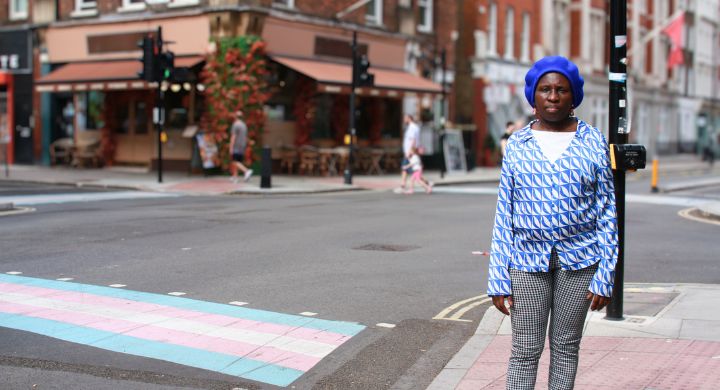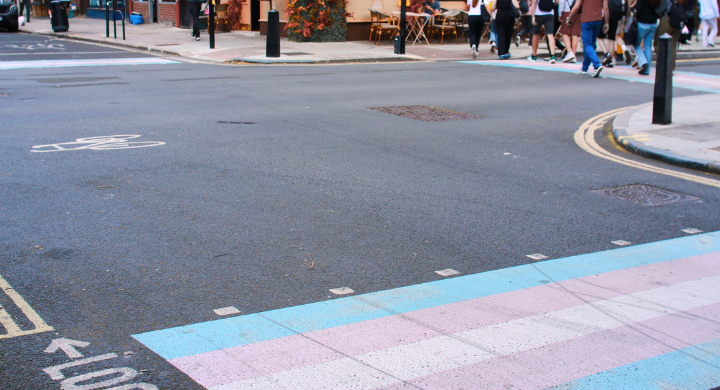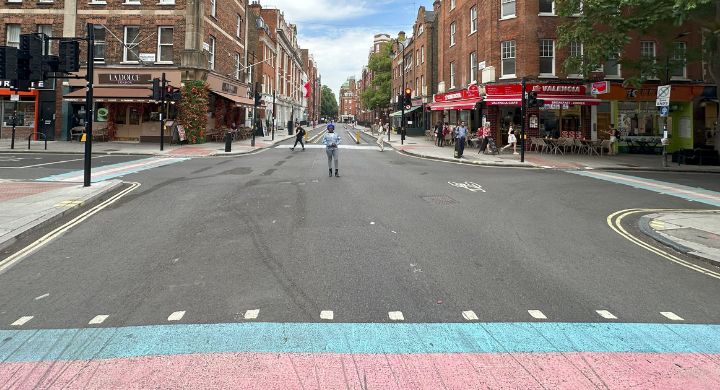Camden Borough Council is facing legal action over a transgender pedestrian crossing which celebrates a gender identity clinic found by the Cass Review to have ‘systematically failed’ vulnerable children.
Supported by the Christian Legal Centre, long-time Camden resident, Blessing Olubanjo, 57, is now threatening to bring a legal challenge to have the four crossings at Tavistock Place and Marchmont Street removed or redesigned.
The intersection is overlooked by a blue plaque for the Soviet Union dictator, Lenin, who once lived at the crossroads, and author of Frankenstein, Mary Shelley.
If the Council fails to take action by removing the crossing, Mrs Olubanjo, who is a member of the Christian Peoples’ Alliance Party, will seek a declaration of unlawfulness, through Judicial Review proceedings.

The challenge, outlined in a pre-action letter, alleges not only breaches of equality and safety obligations, but also a violation of laws prohibiting political publicity by local authorities.
The crossing, painted in the colours of the transgender pride flag (blue, pink and white), was installed by the Council in November 2021 to mark Transgender Awareness Week and ‘in honour’ of The Gender Identity Development Service (GIDS) at the Tavistock and Portman NHS Foundation Trust (Tavistock clinic).
The council has since tried to bury and distance the crossings’ association with the controversial clinic.
Councillor Abdul Hai said at the opening: ‘Camden is renowned for being ”no place for hate”, and added that: ‘These amazing crossings are not only an impressive visual statement to help celebrate transgender awareness, but also act as a reminder of the rich LGBT+ history and daily life currently in the Bloomsbury area and across Camden and should prove to be a popular draw to this vibrant area.’
The Council proceeded despite safety concerns raised by the Royal National Institute of Blind People (RNIB) and its own Equality Impact Assessment.

Tavistock gender identity scandal
The Tavistock clinic was once the world’s largest children’s gender clinic but was permanently closed in March 2024 following revelations of systematic failures in patient care and treatment protocols.
The closure followed the publication of the independent Cass Review, conducted by Dr. Hilary Cass, which exposed critical flaws in the clinic’s approach to treating gender dysphoria in young people.
Dr Cass’s report revealed evidence that puberty blockers and hormones harm gender dysphoric children and uncovered alarming trends in patient demographics and treatment approaches.
Overall case numbers had risen from just 72 in 2009-10 to 1,807 in 2016-17, representing a twenty-five-fold increase over seven years.
Particularly concerning was the demographic shift where female referrals, once a fraction of males, now made up 70 per cent of cases.
Internal concerns about the clinic’s practices had been mounting for years. Those inside the clinic began to raise concerns, leading to whistleblowing and formal complaints about treatment protocols and patient care standards. These internal warnings preceded the comprehensive external review that ultimately led to the service’s closure.
The scandal has had far-reaching consequences for healthcare policy. The review led to a UK ban on prescribing puberty blockers to those under 18 experiencing gender dysphoria, marking a significant shift in national treatment guidelines.
NHS England has committed to implementing all recommendations proposed by the Cass Review as part of a comprehensive reform of gender identity services.
Legal ramifications continue to unfold. The Tavistock clinic is facing legal action for potentially failing their duty to patients, with multiple medical negligence claims currently proceeding through the courts. These cases allege that patients received inappropriate treatment without adequate assessment or consideration of alternative approaches.
The Tavistock scandal represents one of the most significant healthcare controversies in recent UK history, fundamentally altering the approach to treating gender dysphoria in young people both nationally and internationally.
The case has prompted healthcare systems worldwide to reassess their own protocols and evidence base for paediatric gender medicine.
Divisive political issue
Despite all this, the transgender crossings at Tavistock Place remain in place with thousands of members of the public every day forced to cross them.
Launching the case, Blessing Olubanjo, argues that the installation constitutes unlawful political messaging and infringes on her rights as a Christian.
Her legal team has now invoked Section 2 of the Local Government Act 1986, which prohibits councils from publishing material that appears to promote a political party or a politically controversial viewpoint.
The crossing, they argue, is a form of “publication” under the Act, designed to influence public opinion on a divisive political issue.
The letter, sent to the Council this week and giving them 14 days to respond, argues that the crossing represents a breach of the Public Sector Equality Duty due to known risks to disabled and neurodivergent individuals.
The challenge further contends that the installation constitutes a violation of political neutrality laws under the Local Government Act 1986, as well as an infringement of freedom of belief and expression under the Human Rights Act 1998.
Additionally, the letter raises concerns about the improper use of public funds, with the crossing reportedly costing £10,000.
Failing to meet its statutory obligations, the letter argues that the Council has exceeded its lawful authority in commissioning a politically motivated installation rather than essential public infrastructure.
‘Visual endorsement of dangerous ideology’
Blessing Olubanjo said: “I brought this case because I believe in fairness, freedom of belief, and the proper role of public institutions. As a Christian and a taxpayer, I should not be made to feel excluded or marginalised by political symbols in public spaces.
“This crossing sends a message that only one viewpoint is welcome, and that’s not right in a truly democratic society. I’m standing up not just for myself, but for everyone who feels silenced or sidelined by discredited harmful activism forced on the public by ideologically captured local authorities.”

Andrea Williams, chief executive of the Christian Legal Centre, said: “Not only is this crossing a matter of public safety and Christian freedom, it’s about the misuse of public resources for political campaigning. The crossing is a visual endorsement of a contested ideology, installed by a public authority in breach of its legal duties.
“This is not the role of local government.
“Public spaces should be able to be used by everyone not to advance divisive agendas that alienate people of faith and those who hold to biological reality.
“The Cass Review could not have been clearer on how damaging the activity was at the Tavistock clinic for vulnerable children. This was not something to celebrate or ‘honour’ then, and after all the scandals, it definitely is not now. The Council needs to remove the remove or redesign the crossing and apologise to its residents and local businesses.
“We stand with Blessing in her courageous legal challenge to uphold freedom of belief, political neutrality, and the proper use of public funds.”
Find out more about Blessing Olubanjo



